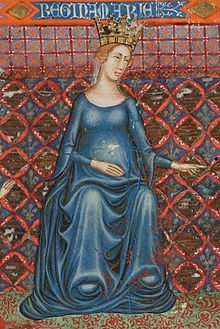Maria of Hungary (1257-1323)
| Mary of Hungary | |
|---|---|

Queen Mary from the Bible of Naples
|
|
| Queen consort of Naples | |
| Tenure | 1285 – 5 May 1309 |
| Born | 1257 |
| Died | 25 March 1323 Naples |
| Burial | Santa Maria Donna Regina, Naples |
| Spouse | Charles II of Naples |
| Issue |
Charles Martel of Anjou Louis of Toulouse Robert of Naples Philip I, Prince of Taranto Raymond Berengar of Andria Peter Tempesta John, Duke of Durazzo Margaret, Countess of Anjou and Maine Blanche, Queen of Aragon Eleanor, Queen of Sicily Maria, Queen of Majorca Beatrice, Countess of Andria |
| House | Árpád dynasty |
| Father | Stephen V of Hungary |
| Mother | Elizabeth the Cuman |
Mary of Hungary (c. 1257 – 25 March 1323), of the Árpád dynasty, was Queen consort of the Kingdom of Naples. She was a daughter of Stephen V of Hungary and his wife Elizabeth the Cuman. Mary served as Regent in Provence in 1290–1294 and in Naples in 1295–96, 1296–98, and 1302, during the absences of her consort.
Mary's mother followed the Shamanist religion, like other Cumans. She was considered a Pagan by contemporary Christians of Europe and Elizabeth had to convert to Catholicism in order to marry Maria's father, Stephen. It's unknown at what age she chose Christianity, but could be possible that she was already raised as an Orthodox in the Hungarian royal court since her childhood.
Mary was the second of six children. Her sisters, Elizabeth and Catherine both became Queen of Serbia. Another sister, Anna married Andronikos II Palaiologos. Mary's only brother was Ladislaus IV of Hungary.
Her paternal grandparents were Béla IV of Hungary and his wife Maria Laskarina. Her maternal grandparents could have been Köten, leader of a tribe of Cumans and unknown mother.
In 1270, when Mary was only twelve years of age, she married the future Charles II of Naples. The wedding took place in Naples on 6 August 1270. The marriage was intended as a double alliance between Naples and Hungary to support the intended conquest of Byzantium by Naples, but it did not serve its purpose as her brother in 1272 made an alliance with Byzantium as well. Maria accompanied Charles on his trips and spent 1278-82 in Provence with her consort. In 1284, she made her first political act: when Charles was taken captive by Aragon, she made the decision to free the Aragonese prisoner Beatrice of Hohenstaufen. In 1285, Charles became monarch but remained in Aragonese prison. She did not take part in the regency for him in Naples, but remained in Provence, where she did take part in the administration from time to time, though she was not formal regent. In 1288, she took part in the negotiations of her consort's release, and the same year, she made a peace treaty with Aragon. Charles was release the same year, and they returned to Naples together. In 1290-94, she was regent for him in Provence.
...
Wikipedia
